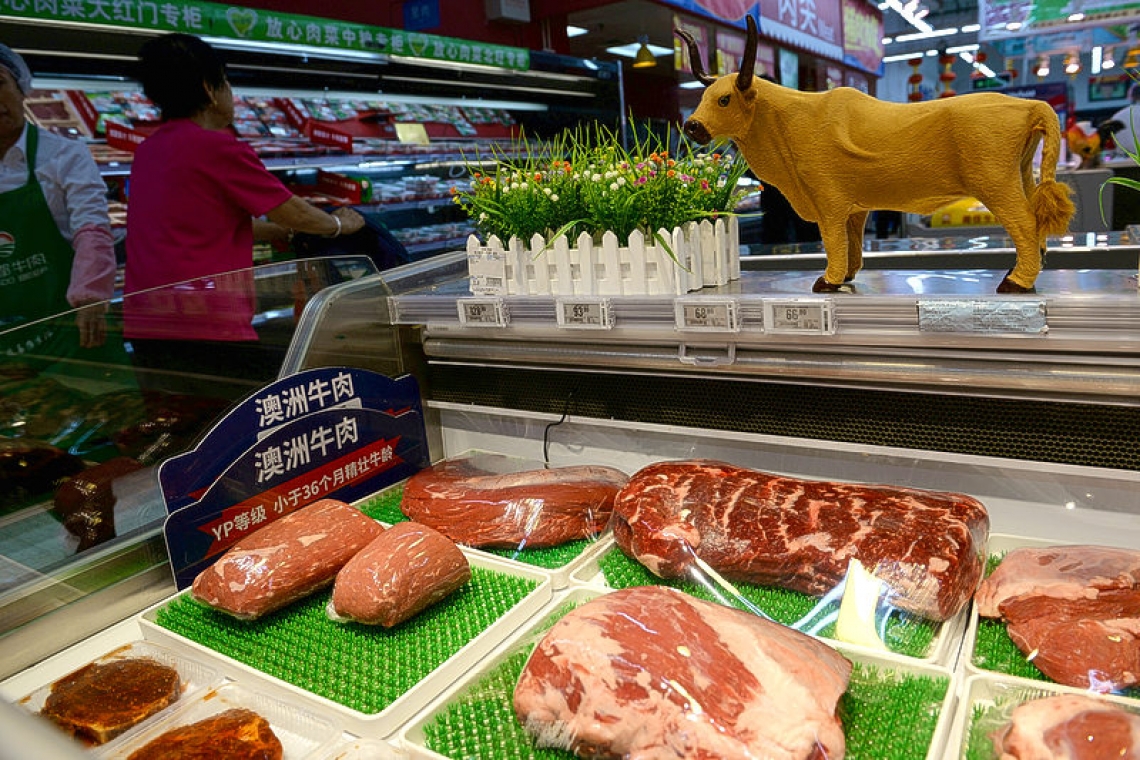SYDNEY--China has suspended beef imports from four of Australia's largest meat processors, as the trade of several key agricultural commodities suffers in the wake of souring ties stemming from a dispute over the COVID-19 pandemic.
The suspension comes after Australia last month called for an independent inquiry into the origins of the novel coronavirus and just days after China proposed introducing an 80% tariff on Australian barley shipments.
"Some politicians in Australia say too much, they need to stop this rhetoric with China, especially criticism and speculation regarding the origin of the COVID 19 virus," said Sam McNiven, founder at Australian beef producer Providore Global exporting to China via a vertically integrated farm-to-table business model. McNiven added that Australia should support its major trade partner China.
Trade Minister Simon Birmingham described the import suspension as "disappointing", but denied it was retribution by China over Australia's desire for a coronavirus inquiry.
China has rejected the need for an independent inquiry, and Beijing's ambassador to Australia, Cheng Jingye, in late April said Chinese consumers could shun Australian goods in response to Canberra's support for such an investigation.
Birmingham said Kilcoy Pastoral Company, JBS's Beef City and Dinmore plants, and the Northern Cooperative Meat Company have been banned from exporting beef to China due to issues with labelling and health certificates. Chinese foreign ministry spokesman Zhao Lijian told reporters that China's customs agency "continuously" found instances of the Australian companies having violated inspection and quarantine requirements and suspended the imports to "ensure the safety and health of Chinese consumers".
"(China's customs) notified the relevant Australian departments and required them to investigate completely the reason for the problem and to fix it," Zhao said during a daily briefing in Beijing. He added that the suspension was unrelated to the bilateral dispute over COVID-19.
Labelling issues were also cited by Beijing when the same companies and two others lost their licences to ship beef to China in 2017 for several months. "Thousands of jobs relate to these meat processing facilities. Many more farmers rely upon them in terms of selling cattle into those facilities," Birmingham told reporters in Canberra.
Australian Meat Industry Council Chief Executive Patrick Hutchinson said the companies made up approximately 20% of Australian beef exports to China.
Australian meat exporters were aware of Chinese labelling requirements, Hutchinson said. "Sometimes their tolerance levels go up and down. This time we have a situation where the tolerance is quite low for this issue."
McNiven who is also a shareholder in the Northern Cooperative Meat Co said the non-conformance issues raised by the Chinese authorities were related to breach of regulations including labels and product descriptions. "I am confident Northern Cooperative Meat Co can respond quickly and appropriately to the satisfaction of Chinese regulators and so that we may continue to export to this important market."
Worth more than A$3 billion ($1.94 billion), Chinese demand for Australian beef surged in 2019, fuelled by a growing middle class and as consumers switched to eating beef as pork availability fell during a swine fever outbreak which decimated Chinese hog herds. China is by far Australia's largest trading partner, taking around 38% of all exports in 2019, and the growing spat weighed on the Australian dollar on Tuesday.
"First barley now beef," said Stephen Innes, Chief Global Market Strategist at AxiCorp. "The Aussie has been under pressure most of the day due to tariff issues with China."
Australia was China's third largest beef supplier in 2019, after Brazil and Argentina. China's beef imports surged in the first quarter of 2020, despite a sharp slowdown in demand as consumers stay away from restaurants following the coronavirus outbreak.
"The impact on China is very small," said a Chinese beef buyer with a state-owned trading firm. "There are a lot of other countries exporting to China. There are no products (from Australia) that cannot be replaced."







